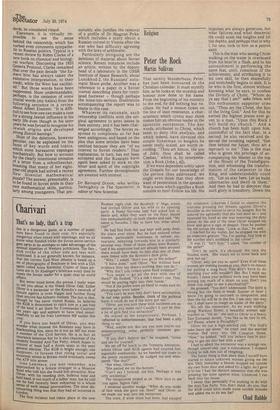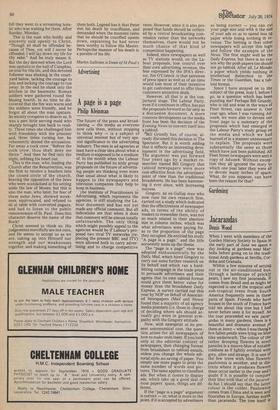Religion
Peter the Rock
Martin Sullivan
That saintly blunderbuss, Peter, has just been honoured in the Christian calendar. It must mystify him, as he looks at the worship and honour now done to his name. From the beginning of his ministry to the end, he did nothing but vacillate. He had a season ticket on the line of least resistance, a characteristic which cynics may think makes him an obvious leader in the apostolic succession. The key words, attributed to Christ, which seem to deny this analysis, and which indeed, have elevated this simple fisherman to heights he never really scaled, are worth recording: "Thou art Simon, the son of John; thou shalt be called Cephas," which is, by interpretation, a Rock (John i, 42).
If we were dependent solely upon the Gospels for our knowledge of the person thus addressed, we might even think that they show want of penetration in the speaker. Was a name which signifies a Rock suitable to him? Follow his life. His impulses are always generous, but what failures and what descents! He could scale the heights and hit the depths, and perhaps that is why I, for one, look to him as a patron saint.
This is the man who seeing Christ walking on the water is overboard from his boat(in a flash, and to his astonishment is performing the same feat, until, conscious of the achievement, and attributing it to his own skill, he then shamefully and wretchedly begins to sink. It is he who is the first, almost without knowing what he says, to confess the Divinity of Christ. "Whom do ye say that I am?" asks Jesus, and this enthusiastic supporter cries out, "Thou art the Christ, the Son of the living God." And for this he earned the highest praise ever given to a man, 'Upon this Rock I will build my church.And a church has been built upon him, unmindful of the fact that, in a second, he also received and deserved the crushing reproof, "Get thee behind me Satan; thou art a reproach to me." This is the man who is given the privilege of accompanying his Master to the top of the Mount of the Transfiguration, and witnessing the transformation of the carpenter to the King, and understandably could cry, "Let us stay here. Let us build tabernacles and dwell in them." And then he had to discover that such glory is transitory. Down the hill they went to a screaming lunatic who was waiting for them. After Sunday, Monday.
This is the man who boldly and sincerely said openly to Christ, "Though all shall be offended because of Thee, yet will I never be offended. I will lay down my life for thy sake." And he truly meant it. But the day dawned when the Lord was upstairs in the hall of Caiaphas, on trial for His life, and this devoted follower was slinking in the courtyard below, lacking the courage to join and lacking the courage to run away. In the end he slunk into the kitchen in the basement. Roman soldiers were gathered round the blazing hearth. In no time he discovered that the fire was warm and the soldiers were friendly, and he forgot all about the man upstairs. So society conspires to disarm us. It was a pert little serving maid who sharply brought him back to reality. Three times she challenged him with friendship with the prisoner and, three times cursing her, he vehemently denied the accusation. Far away a cock crew. "Before the cock crow, thou shalt deny me thrice." And then he fled into the night, sobbing his heart out. This is the man, who, leading the Church after the Resurrection, was the first to receive a heathen into the closed circle of the church, braving the opposition of the Jews who were scandalised at his setting aside the law of Moses; but this is also the man, who later, for fear of these same Jews, showed weakness, equivocated, and refused to sit at table with converted pagans, and had to listen to the public remonstrance of St. Paul. Does this character deserve the name of the Rock?
Christ seemed to think so. His judgements mercifully are not ours, and He seems to accept us as we are, taking up into Himself our strength and our weaknesses together, and making something of them both. Legend has it that Peter met his death by crucifixion, and demanded when the moment came that he should be crucified upside down, explaining he had never been worthy to follow His Master. Perhaps the manner of his death is a parable of his life.
Martin Sullivan is Dean of St Paul's



































 Previous page
Previous page